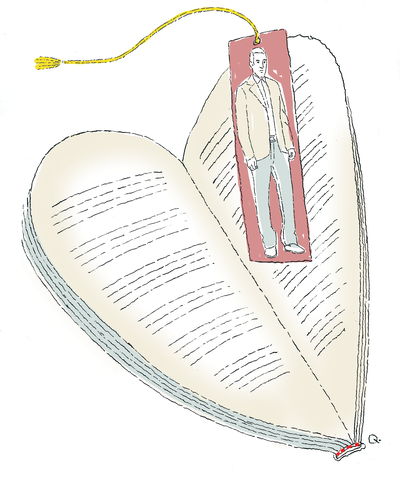Everything is Copy: The man who doesn’t read

Recently I tried to date a tall man who doesn’t read.
While he spent plenty of time looking at his devices, he read no books, no magazines, not even, I’m fairly sure, the back of cereal boxes. Somehow he managed to get through college and live in this world for half a century without understanding why anyone would spend leisure hours curled up with a novel.
I told myself it didn’t matter. Not everyone has to be like me; I’m a big fat nerd. I listen to audiobooks in the car and while running on the trails, my phone has hundreds of e-books in case I ever have to wait for more than five minutes, and I am always reading at least two bound books – one work of serious nonfiction and a nightstand mystery novel.
Because I like to be around people who know things I don’t, my love life has been replete with physicists, computer scientists, doctors, and even some engineers (in other words, men who are good at packing camping gear, fixing electronics, and explaining quantum mechanics). Many of them are not readers until I get my hands on them and it gives me great pleasure when I know them well enough to recommend books they will love.
I possess few talents, but one of them is matching a person with a book. Most of the time, when people say they don’t like to read, or when students make dumb declarations like “I hate history” or “Science is boring,” I tell them that’s not their fault; they simply haven’t encountered the right authors. A good writer can get you interested in things you didn’t think you gave one hoot about.
Surely, that was the case with the tall man. So I gave him two great nonfiction books, by top-shelf authors, on a subject I knew interested him. One he refused to read because it was too long (it was on the short side of average); the other, which had pictures, he critiqued in ways that showed me he had no idea, really, how to read.
The tall man was soft-spoken, attentive, and not stupid, though he said things that revealed he had never left the country, had worked the same job for most of his life, and had cultural knowledge nurtured in a fraternity. He lived alone and worked mostly remotely, from a place that was itself isolated. His television, bigger than my dining room table, had a watch list full of serious movies and History and Discovery channel documentaries; mine contains the “Real Housewives” of three different cities, “Naked and Afraid” and “The Bachelor.”
I tell you this not to go all Taylor Swift on the guy, but because I know he’s not the only adult who doesn’t read for pleasure. When I talk to kids, I tell them it’s fine if they don’t like to read. They will, however, probably grow up to be idiots. After they get over the shock of an elder speaking to them like this, I find out what they’re interested in and recommend some titles.
When I published a young adult novel, I learned how passionate teens (and kids even younger) are about books. Intense in the best way, they give themselves over, whole hearts and minds, to characters they identify with or hold in contempt. They read themselves into situations they are never likely to encounter. Their worlds get bigger and smaller; they travel far from their bean bag chairs and become attached to fictional friends.
My graduate students, unsure about their place or prospects in the world, often read in harsh and critical ways. It’s far easier, after all, to tear something apart than it is to create. So I always ask them, Why do we read? They come up lots of answers: for entertainment, for diversion, to learn stuff, to experience other cultures, to appreciate beautifully wrought sentences. All true.
For me, though, it’s simple. Literature helps us to live. We learn about ourselves, other people, and the planet. We can talk about the importance of diversity until the cows come home, but the truth is, most of us lead pretty homogenized lives. We don’t have many opportunities to get to know the intimate workings of people different from us. Hell, we rarely have access to the deepest thoughts of those we’re in daily contact with. Good books do lots of things, not least is engender empathy. When you understand the motivation for actions you might not agree with, it’s harder to be dismissive.
Ultimately, I just couldn’t date a man who doesn’t read, even if he was tall. I am too judgmental, unwilling to spend time with someone whose values do not align with mine. For the record, I wouldn’t go out with a baby seal-clubber or a Trump supporter either.
But not until I was faced with a person unabashed about his own lack of literacy did I stop to think how much I take for granted the idea that reading is fundamental.
Rachel Toor is a professor of creative writing at Eastern Washington University. She is the author of one novel and four books of nonfiction, the most recent of which is “Misunderstood: Why the Humble Rat May Be Your Best Pet Ever.” Her column, Everything is Copy, appears monthly in the Sunday Today section.